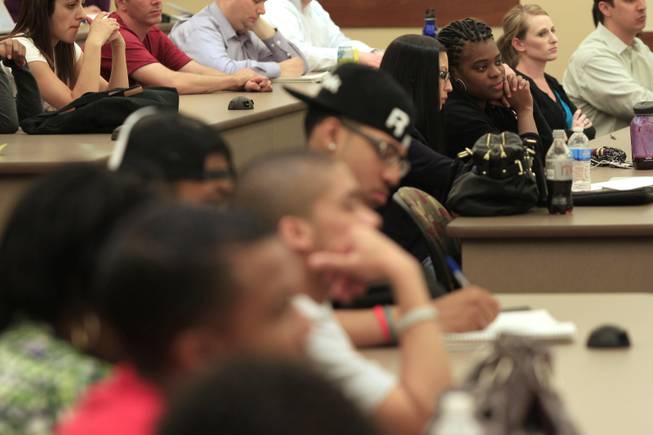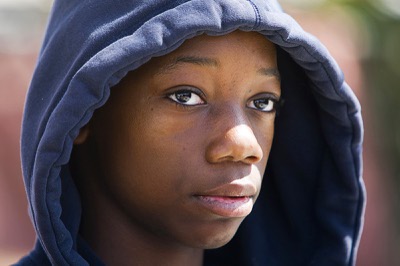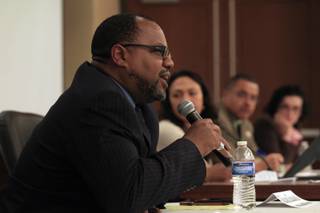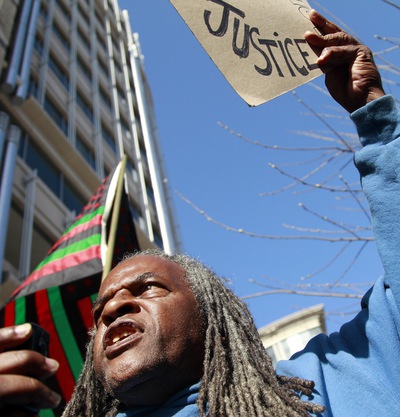
Students and other interested parties listen to a panel discussion about the killing of Trayvon Martin at UNLV Tuesday, April 10, 2012.
Wednesday, April 11, 2012 | 2 a.m.
The circumstances surrounding the fatal shooting of Trayvon Martin have wide-reaching implications and lessons for the Las Vegas community, panelists at a UNLV forum Tuesday night said.
The case of the 17-year-old Florida teenager who was shot to death in February by a neighborhood watch captain has galvanized the nation, sparking protests and hoodie gatherings in opposition to Florida’s controversial “stand your ground” law. Nevada has a similar self-defense law, which justifies the use of deadly force without any obligation to first retreat from conflict.
Nearly 100 graduate and law students attended the UNLV forum, held in the Moot Courtroom at the Boyd Law School and organized by the Black Graduate Student Association and the Black Law Student Association. The forum was held to examine the various legal and societal issues surrounding the case and look at ways students can prevent similar incidents from happening again.
A diverse range of panelists proffered their opinions on the Martin case from legal, journalistic and sociological perspectives. The conversation was engaging and frank at times, and delved into complex issues such as racial profiling and self-defense laws.
During the 2011 legislative session, Nevada passed its “stand your ground” law, which went into effect in October. According to the Legal Community Against Violence, Nevada is one of 25 states with a self-defense law that allows the use of deadly force when an individual feels an eminent and reasonable threat to their life without an obligation to first stand down or retreat.
While Nevada’s self-defense law is similar to Florida’s in that there is no duty to retreat before standing one’s ground against an attack, the burden of proof remains with the defendant in Nevada, said Addie Rolnick, a UNLV law professor.
That’s not the case in Florida, where a legal provision prohibits police from prosecuting and even arresting an individual who claims a “justifiable homicide” under the “stand your ground” law, Rolnick said. The burden of proof in Florida lies with the prosecution, she said.
“Florida gives blanket deference to what anyone says,” Rolnick said, noting that self-defense laws have been expanded over the years.
Many in the black community have argued that race played a pivotal role in Martin’s death. George Zimmerman, the neighborhood watch captain who shot Martin, is Hispanic. Martin was black.
In a 911 tape, Zimmerman is heard calling Martin “suspicious” and saying he looks like he may be “up to no good.”
Before the forum began, organizers played a YouTube video produced by Howard University law students. In the 2 1/2-minute video, male students at the historically black college dressed in black hoodies posed the question, “Do I look suspicious?”
While some may shy away from this reality, there are implicit and subconscious psychological biases tied to one’s “blackness,” which may include danger or being suspect, Rolnick said.
Rainier Spencer, an Afro-American Studies professor at UNLV, said he agreed with Rolnick’s assessment.
“We can’t and won’t say it, but everyone is afraid of the young, black man, right?” he said, to nods from the mostly black audience.
The bias stems from societal and media portrayals of blacks and it goes back to the days of slavery, Rolnick said. Blacks are also often seen as being expendable, because historically they have been characterized by an absence of rights and personhood, she said.
A death of a black slave — considered 3/5th of a white person when the United States was founded — wasn’t considered a loss of life, but of property, Rolnick said. Even though that worldview has been legally struck down, it still exists in the subconscious, she said, citing research that found fewer black homicides than white homicides led to the death penalty.

Brandon Johnson, 12, attends a "hoodie" gathering at Raw Remedies, a therapeutic beauty boutique at 203 East Colorado St. near Charleston and Casino Center boulevards Sunday, March 25, 2012. People, many wearing hooded sweatshirts, came seeking justice for 17-year-old Trayvon Martin, a high school student who was shot and killed February 26 in Sanford, Fla.
Regardless of the societal biases, it shouldn’t matter that Martin looked suspicious, argued Allen Lichtenstein, an attorney with the American Civil Liberties Union. Lichtenstein said he was critical of the Howard University students for asking what he perceives to be the wrong question: “Do I look suspicious?”
“It’s wrong because it doesn’t matter if someone looks suspicious,” Lichtenstein said. “You are allowed to look suspicious.”
Lichtenstein criticized law enforcement’s use of “Terry stops,” whereby police can briefly detain someone if an officer has “reasonable suspicion” that someone is, has or is about to commit a crime.
“Cops couldn’t have stopped (Martin) legally,” he said. “And a citizen couldn’t have either.”
Legally, police are only able to stop someone on actions alone, and never based on race, gender, age and other physical characteristics. However, a study of Terry stops in New York City found that police there were stopping minorities in disproportionate numbers to their overall population, Lichtenstein said.
Lichtenstein sees these stops as an open invitation for racial profiling, and would like to see Las Vegas police begin to collect and release data on these stops.
Regardless, research shows that the public — even among minority communities — hold police departments in high regard, said William Sousa, an UNLV criminal justice professor. That’s true, even in Las Vegas, he said, where police have been criticized for the use of deadly force.
Lawrence Mower, a reporter with the Las Vegas Review-Journal, outlined the newspaper’s findings from its series “Deadly Force: When Las Vegas Police Shoot, and Kill.”
Although the black population in Las Vegas constitutes just 10 percent of the general population, more than a third of officer-involved shootings were of blacks, Mower said. About half of unarmed people who were shot by police officers were black, he added.
“These were startling statistics to us,” Mower said. “The data was pretty telling.”
Richard Boulware, a local attorney and vice president of the local chapter of the NAACP, said Las Vegas is one of a few major metropolitan areas that doesn’t have a major oversight board for its police. Boulware said he would like to see local and state laws amended so that the Las Vegas community can better address racial profiling.
But Boulware also sympathized with police. Oftentimes, police departments are reacting to community concerns, which may be rooted in stereotypes and racial biases, he said. Someone who doesn’t “belong” in a community may be investigated because police feel an obligation to its community to react, Boulware said.
However, in the Martin case, Boulware was critical of the “provocation” clause of Florida’s self-defense laws. Both Nevada and Florida self-defense laws state that one cannot invoke the “stand your ground” clause if he or she initiates a physical altercation.
In a 911 tape, Zimmerman is heard being advised by the operator not to pursue Martin. Zimmerman did not heed the operator’s direction, Boulware said.
“He inherently created a violent situation by chasing after Trayvon,” Boulware said, although noting that Zimmerman claims Martin provoked an attack. “Who was the one who initiated and provoked the incident?”
Colin Seale, a third-year law student, said he thought the forum was informative. Seale said he was wary of law enforcement after hearing about high-profile officer-involved shootings while growing up in New York.
Seale said that since he was 10 years old, he’s had “the talk” with teachers and family members who warned him to dress and act a certain way around police to avoid being caught up in an officer-involved shooting. Appearance should not matter, but it matters, he said.
“It’s scary that I’m scared of the police,” Seale said, adding that he addresses police officers with “sir” and avoids wearing baggy pants. “It doesn’t seem right.”
Carrie Sampson, president of the UNLV Black Graduate Student Association, said she was pleased by the student turnout. She said she hoped the forum offered engaging dialogue on the issues surrounding the Trayvon Martin case, and said that they may hold a similar forum in the future.
“It’s clear that this case brought about a lot of emotions and sparked people’s interest,” Sampson said. “We wanted to raise awareness that institutional racism isn’t just an issue in Florida, but across the nation.”



Join the Discussion:
Check this out for a full explanation of our conversion to the LiveFyre commenting system and instructions on how to sign up for an account.
Full comments policy